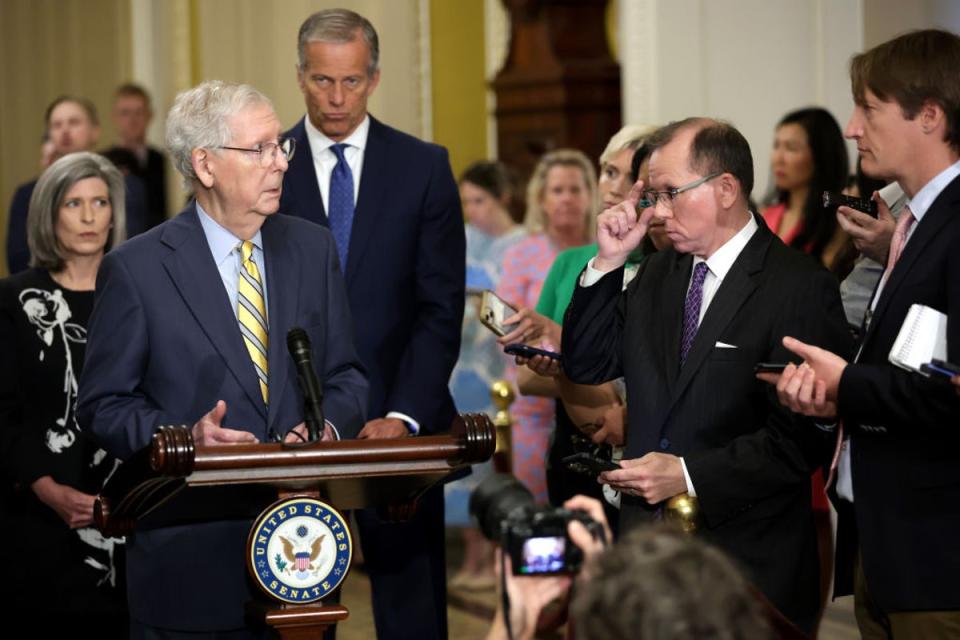Bipartisan border security bill fails again after Republicans shoot down measure on key election issue

A bipartisan piece of immigration and border security legislation died again on the Senate floor on Thursday after Republicans blocked a bill meant to clamp down on the number of migrants allowed to claim asylum at the US-Mexico border.
The legislation is now dead for a second time after failing a procedural vote with 42 Democrats and one Republican voting in favor of considering the bill; and six Democrats, one independent and 42 Republicans voting against.
The bill, negotiated by a bipartisan group of senators, was already rejected by most Republicans in February when it was linked to a foreign aid package for Ukraine, Israel and other US allies. Had it passed, it would have provided the US president with the authority to shut down the asylum system if unauthorized border crossings reached a certain monthly threshold. It would also have tightened standards for asylum-seekers and empowered federal officials to quickly remove those who did not qualify.
The bill had initially seemed set up for success but quickly collapsed after Donald Trump and his cadre of loyalists in the House and Senate GOP came out against it. Mr Trump was reportedly apoplectic over Republicans joining with Democrats on one of his key campaign issues.

Now, with immigration and border security one of the top issues of the 2024 election, Democrats are looking for an answer to the barrage of GOP attacks, led by presumptive Republican presidential nominee Mr Trump.
The bill was brought up for vote again on Thursday after being introduced by Democrat Chris Murphy, an attempt by the White House and its allies to underscore Republicans’ failure to come to the table. Senate Majority Leader Chuck Schumer highlighted the GOP resistance to the bill following the vote.
“Senate Republicans again rejected the strongest, most comprehensive bipartisan border bill we’ve seen in decades. A sad day. While the GOP isn’t interested today in getting this done—we’ll keep trying. It’s too important to our national security, our communities, our country,” he posted on X.
Minutes after it failed, the Biden campaign began hitting Republicans for its repeated defeats.
But the bill has also been heavily criticized by some progressive Democrats and Latino members of the party over the bill’s exclusion of key priorities including a pathway for citizenship for undocumented immigrants including “Dreamers”, those brought to the US by their parents when they were young children.
Thursday’s vote, meanwhile, leaves Republicans with the dilemma of bad optics. The party took a political beating from Democrats after the failure of the border bill in February, with the president’s party blasting them for doing nothing on the issue. The GOP continues to face awkward questions from more engaged voters on border security.
On Thursday, Republicans such as James Lankford, the GOP’s lead negotiator in the border negotiations, voted against it, as did frequent swing votes Susan Collins and Mitt Romney. The bill also picked up new Democratic opponents, Sens Laphonza Butler and Cory Booker.

“I think it’s going to be an overwhelming number that vote no,” the GOP caucus’s whip, John Thune, told The Independent ahead of the vote on Wednesday.
Senator Alex Padilla, one of a handful of Latino Democrats in the upper chamber, was also a “no” on the bill. Padilla has been a vocal critic of the legislation for months, not just of the policy itself but the process: he has strongly criticized the exclusion of Latino senators from the negotiations.
“This bill contains some of the same tried and failed policies that would actually make the situation worse at the southern border,” he said in a floor speech on Thursday.
“It’s not just what’s in the bill that troubles me; it’s what’s not in the bill. If enacted, this bill would fail to provide relief for a single Dreamer, for a single farm worker, or a single essential worker or long-term resident of the United States who has been here for years, in some cases decades, working, paying taxes, contributing to the strength of our communities and our country and the success of our economy.”


